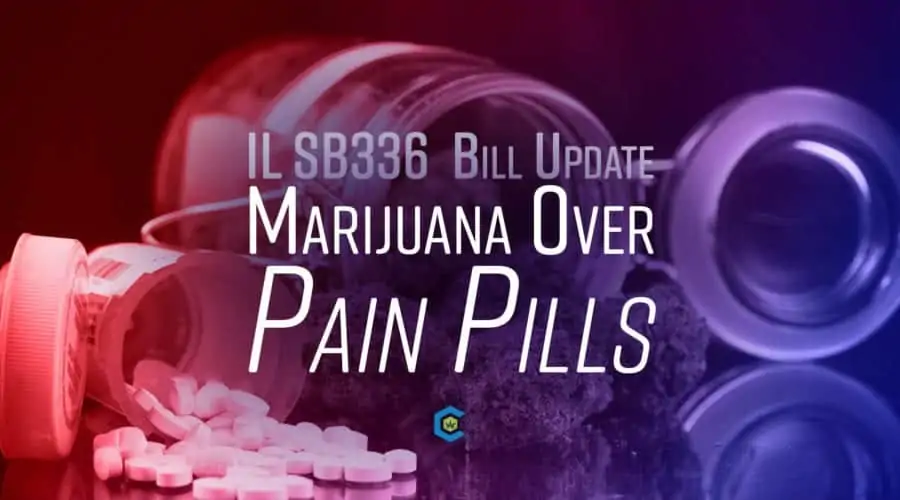Swapping Pain Pills for Pot: IL SB336 Breaking News Update
Table of Contents
With Pritzker finally, in office, Rauner’s term is simply a bad memory that couldn’t possibly fade fast enough. J.B. Pritzker ran for governor of IL with a strong, pro-cannabis platform supporting legalization and access to the patients who need it. Now that he is finally in office, the legalization of cannabis in IL seems more promising than ever before.
While Rauner was never known for his pro-cannabis views (on account of he didn’t have any), the Opioid Alternative Pilot Program that will allow patients to swap addicting pain pills for cannabis was signed into law just shortly before Rauner finally left as IL’s long-time, unpopular governor.
More Than an Empty Campaign Promise
Pritzker, although still in the early days of his administration, seems to be wasting no time in launching into his pro-cannabis and pro-legalization message to all Illinoisans. Indeed, several news outlets have…for statewide cannabis legalization for adult recreational use is underway in Illinois.
What Are Pritzker’s Reasons For Wanting to Legalize Cannabis?
As reported in The Washington Times, in his inaugural address on Monday, January 14, 2019, Pritzker said the following: “In the interests of keeping the public safe from harm, expanding true justice in our criminal justice system and advancing economic inclusion, I will work with the legislature to legalize, tax and regulate the sale of recreational cannabis in Illinois.”1
Public Safety, Criminal Justice Reform & Economic Inclusion
Public safety, criminal justice reform, and economic inclusion are all solid reasons Pritzker is presenting to justify cannabis legalization in a state suffering from seemingly insurmountable debt, decades of political corruption, climbing rates of gun violence, and suffering tremendously from the opioid crisis.
While all of these reasons are important and can be addressed by cannabis legalization, there is one issue that is the most pressing at the moment and a public health emergency to be reckoned with: the opioid crisis.
Senate Bill 336: The Bill That’s Paving the Way to Recreational Cannabis in IL
Thanks to mounting pressure for relaxing restrictive cannabis policies and expanding access, former Gov. Rauner, likely through gritted teeth and legendary reluctance, signed SB336 into law.2 This bill was designed to ease regulations and barriers to access for IL patients in late August of 2018.
Being the anti-cannabis crusader he has been, Rauner likely signed this in hopes of a futile re-election campaign. Nevertheless, the bill itself holds great promise for the people of IL by expanding the medical cannabis program as well as easing regulations such as background checks and fingerprinting. However, its most dramatic and influential change is in regards to the nationwide opioid epidemic.
The “Gateway Drug” Is Helping Millions Escape Pain Pills and Opioid Addiction
The opioid epidemic has reached epically disastrous proportions in the United States, with millions of Americans addicted to opioid drugs like Vicodin, Morphine, and Heroin.3,4 However, retrospective statistical analysis demonstrates that states with medical cannabis programs have lower opioid-related deaths, overdoses, and fatalities than those who do not.5,6 Thus, the need for something like cannabis to mitigate this growing disaster has never been greater than it is today.
Does This Mean I Can Get My Card If I Have a Chronic Pain Condition?
No, not necessarily. Patients must already actively prescribed opiates or deemed eligible and in need of them by their physician. Only then can the patients opt to go down the path to the dispensary instead of the pharmacy. While chronic pain itself is not a qualifying factor for a cannabis card in IL at the moment, the induction of this new policy foreshadows a greater likelihood of that finally happening.
Opioid Alternative Pilot Program (OAPP): An Ambitious Update to Policy
Besides expanded access and removal of some regulatory roadblocks, one of the most significant measures offered in the bill allow patients to choose cannabis as an alternative to addictive and dangerous opioid pain medications.2
Cannabis has been proven to not only be an effective adjunct to opioid drugs but an effective alternative as well.7 By now, the term “opioid crisis” and the significant devastation it’s caused have become relatively well known. But how exactly is medical cannabis coming to the rescue?
States with Cannabis Programs Show Reduced Opioid Rx’s, OD’s, & Deaths
It has been demonstrated that states who have successfully adopted a medical cannabis program have reduced prescriptions, overdoses, and fatalities due to opioid overdose.5,6 As mentioned earlier, cannabis is an effective way to reduce the amount of opioids one needs for pain relief, as well as replacing opioid therapy altogether, depending on the severity of the pain and the efficacy of cannabis in treating it.7
To this effect, expanding access to cannabis and offering it as a first-line treatment for pain over that of opioids is a powerful step in the right direction.
What to Expect: An Overview of the new OAPP
The IL department of health finally released details on how this will all play out. Before jumping in, it’s important to note that these are significant regulatory changes to cannabis, drug, and healthcare policy, and the wheels of bureaucracy are slow to turn and stabilize
Information for the following section outlining the process for the OAPP was obtained from the following Chicago Tribune article discussing the rollout of this new program.
Trading Opioids for Cannabis Step 1: The Physician Certification Form
To take advantage of the OAPP, patients visiting their doctors must either already be prescribed an opiate they are actively taking, or the doctor must determine that one could be prescribed. The physician then electronically submits a physician certification through a new registration system.
Conny Mueller Moody, former deputy director for the Office of Health Promotion and Medical Cannabis, touted this as one of the shiny new technological systems being implemented in the state; secure and accessible only by physicians. Once the physician submits the certification on their end and into the new system, the patient is ready to finish registration on their own and head to a dispensary for medication.8
Trading Opioids for Cannabis Step 2: Get Yourself Authorized
Once patients have their physicians submit their authorization, they are ready to go to a dispensary or local health department in case they need help registering for the program. Alternatively, patients can register themselves on the OAPP’s website; however, the state is still in the midst of setting this up for patients.
Patients will need to produce a copy of their IL Driver’s License or State ID and a passport-style photo along with $10. Commercial vehicle and school bus drivers must cancel their certifications to be eligible for this program.8
Trading Opioids for Cannabis Step 3: Get Yourself Medicated
Once the necessary forms and items are uploaded into the state’s new system, it will produce a registration number and approve patients to register at any single state-registered medical cannabis dispensary at a time. Instead of plastic cards, patients have the option of printing certifications that will be emailed to them or simply show the certificate on their cell phone.
Shortly after registering, patients can purchase = up to 2.5 ounces of medical cannabis every two weeks for up to 90 days, after which another physician certification and a $10 renewal fee will be required for patients to continue receiving cannabis over opioids for their pain.
Sounds Simple! What Could Possibly Go Wrong?
As with many new programs and policies, especially those introducing extensive and radical changes to the status quo, it will inevitably be a bumpy ride at first, with unforeseen setbacks, challenges, and issues that are bound to arise. While this program is new and unfamiliar to patients, this unfamiliarity extends to physicians too.
“Physicians Have No Clue This is Coming. IDPH Has Not Educated Us On This…”
Being an experienced physician in the medical cannabis sphere, Dr. Khare is able to think three steps ahead and help our community understand the nuances and complexities of these issues that general mainstream media doesn’t explore. In regards to the OAPP, Khare states, “the only thing I’d warn patients about is this:
- Physicians have no clue this is coming. IDPH has not educated us on this and hasn’t set up a webinar up (like they did for dispensaries)
- MDs need to “register” to have online submission (digital signature) of their certification (that the patient warrants opiates and qualifies for OAPP)
- This will make it so that patients wanting to go through OAPP will need to go to MDs who charge a lot of money to get the digital signature (because nobody knows how to sign off on it).
A Huge Leap Forward
The passage of SB336 was perhaps one of the most remarkable strides in growing (pun intended) the state’s medical cannabis program. With the opioid epidemic claiming countless lives every single day all across the country, the time for radical change is now.3,9 Too many lives are cut short by the vicious cycle that starts from something as innocent a simple broken bone or wisdom tooth operation.
Those with addictive personalities would be wise to choose cannabis for the pain over the significantly more addictive and dangerous opioid narcotic alternative. Over time, as the kinks get worked out and this program begins to flourish, so too will IL’s blossoming medical cannabis community and all the good that comes out of it. Looking ahead, the future of medical cannabis in Illinois just got a whole lot brighter.
If you enjoyed this article, you may enjoy…
Medical Marijuana vs. Chronic Pain: Two Testimonials
How Hemp is Empowering Patients to Combat Chronic Pain & Battle the Opioid Epidemic
WORKS CITED
- https://www.washingtontimes.com, T. W. T. J.B. Pritzker, Illinois governor, vows to work toward marijuana legalization in the inaugural address. The Washington Times Available at: https://www.washingtontimes.com/news/2019/jan/15/illinois-governor-vows-work-toward-marijuana-legal/. (Accessed: 16th January 2019)
- Illinois General Assembly – Bill Status for SB0336. Available at: https://ilga.gov/legislation/billstatus.asp?DocNum=336&GAID=14&GA=100&DocTypeID=SB&LegID=100276&SessionID=91. (Accessed: 16th January 2019)
- Seth, P., Scholl, L., Rudd, R. A. & Bacon, S. Overdose Deaths Involving Opioids, Cocaine, and Psychostimulants – United States, 2015-2016. MMWRMorbidity Mortal. Wkly. Rep. 67, 349–358 (2018).
- Dowell, D., Haegerich, T. M. & Chou, R. CDC Guideline for Prescribing Opioids for Chronic Pain – United States, 2016. MMWRRecommendations Rep. Morb. Mortal. Wkly. ReportRecommendations Rep. 65, 1–49 (2016).
- Bradford, A. C. & Bradford, W. D. Medical Marijuana Laws Reduce Prescription Medication Use In Medicare Part D. Health Aff. Proj. Hope 35, 1230–1236 (2016).
- Bradford, A. C., Bradford, W. D., Abraham, A. & Bagwell Adams, G. Association Between US State Medical Cannabis Laws and Opioid Prescribing in the Medicare Part D Population. JAMA Intern. Med. (2018). doi:10.1001/jamainternmed.2018.0266
- Lucas, P. Cannabis as an adjunct to or substitute for opiates in the treatment of chronic pain. J. Psychoactive Drugs 44, 125–133 (2012).
- Prescribed opioids but want to try medical marijuana instead? A new Illinois program will let you. Here’s how. – Chicago Tribune. Available at: https://www.chicagotribune.com/business/ct-biz-illinois-opioid-marijuana-program-20190103-story.html?fbclid=IwAR2N2rZ2yn3O7ntWzKD-ijEX99osudyH8UVnwx3ganmzCRARcb-DfhX0GsI. (Accessed: 16th January 2019)
- Gladden, R. M., Martinez, P. & Seth, P. Fentanyl Law Enforcement Submissions and Increases in Synthetic Opioid-Involved Overdose Deaths – 27 States, 2013-2014. MMWRMorbidity Mortal. Wkly. Rep. 65, 837–843 (2016).


